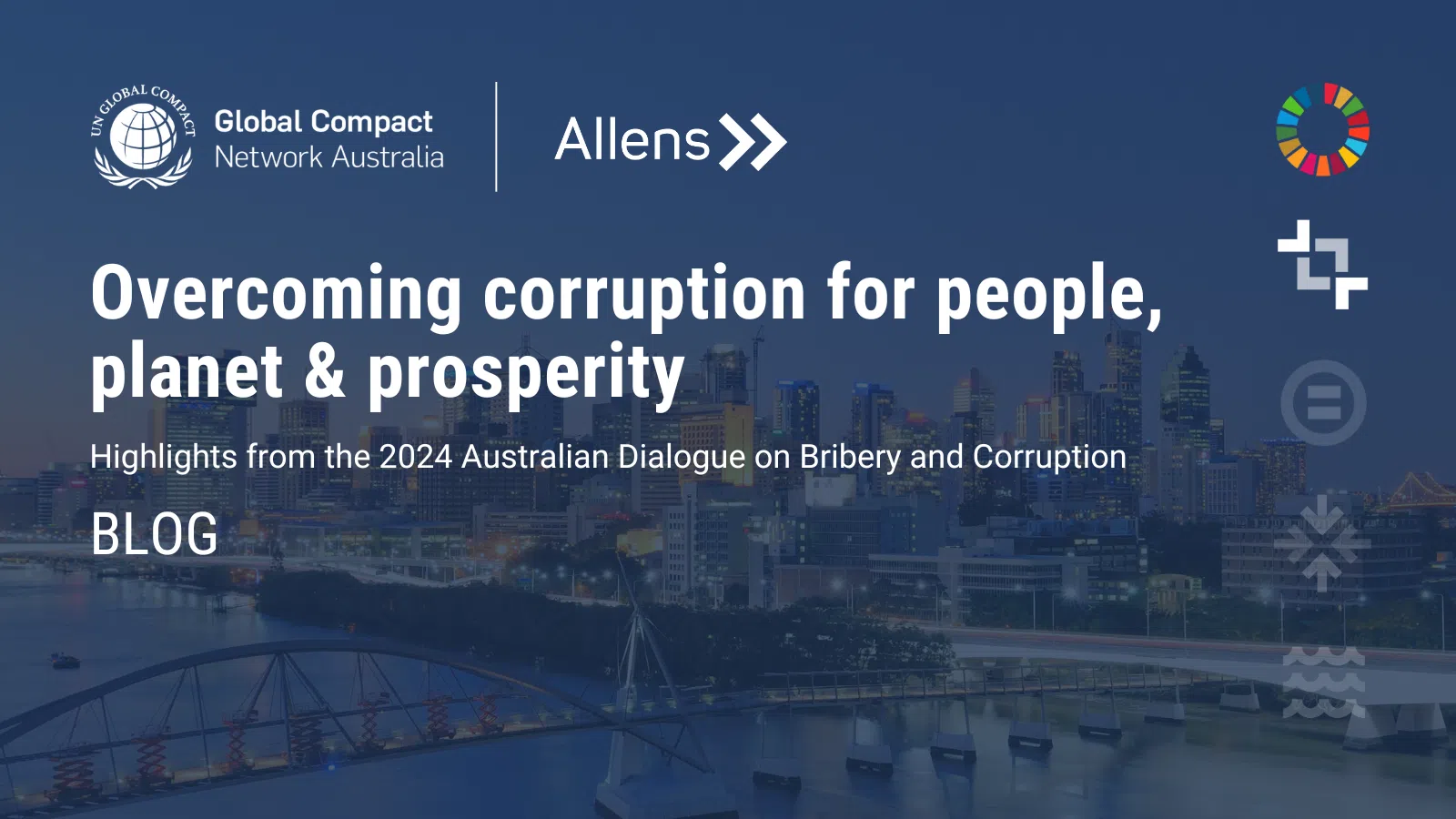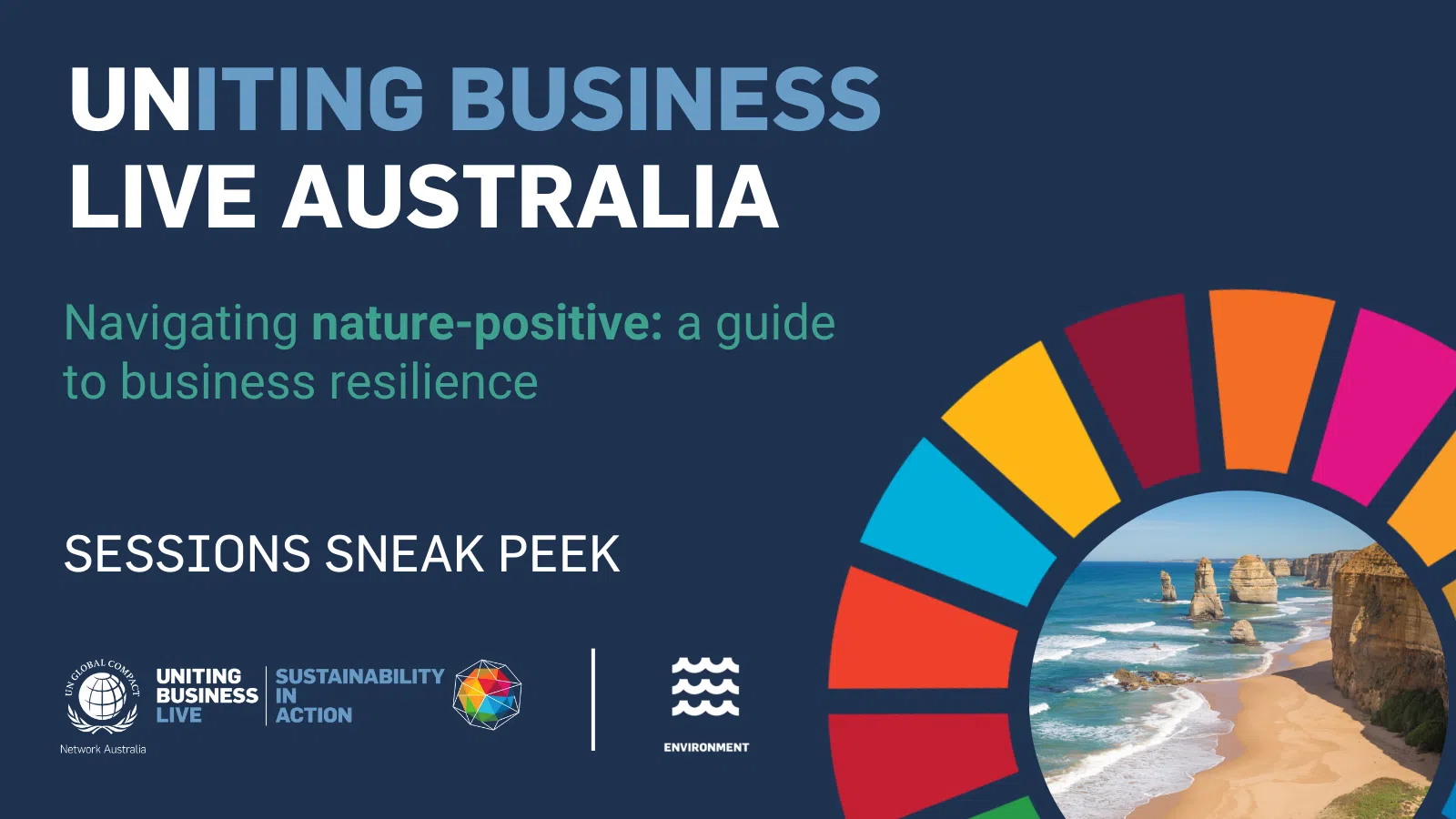
Blogs, Environment & Climate Change
Australia’s climate moment: private sector NDC engagement and global dialogue
Dr Evan Center | August 19, 2025
Australia’s climate ambition took centre stage this month as the United Nations Framework Convention on Climate Change (UNFCCC) Executive Secretary, Simon Stiell, visited the country for a series of high-profile engagements. From ringing the bell at the Australian Securities Exchange (ASX) to convening an executive roundtable with leading business voices, the message was clear: Australia has a pivotal opportunity to lead on climate — but it must act decisively.
Why is uplifting Australia’s Nationally Determined Contribution (NDC) important?
This year, Australia is due to submit a new Nationally Determined Contribution (NDC), which must include a 2035 emissions reduction target, in accordance with the Paris Agreement. As climate impacts intensify and global momentum grows, Australia has a critical opportunity — and responsibility — to raise its ambition and put forward a 1.5°C-aligned NDC. This must be backed by a clear and consistent national policy framework to ensure such commitments are implemented.
The recent landmark International Court of Justice (ICJ) advisory opinion affirms that committing to 1.5°C-aligned NDCs is a legal obligation. The decision states that nations have limited discretion when determining their NDCs and that, given the seriousness of the threat of climate change, governments must exercise stringent due diligence and ensure their climate action plans meet the obligations of the Paris Agreement, including the global goal of limiting temperature rise to 1.5°C above pre-industrial levels. This means that Australia must make every effort to ensure that its NDC reflects the greatest level of ambition it can achieve to fulfil the legally-binding goals of the Paris Agreement.
What is a Nationally Determined Contribution?
Nationally Determined Contributions (NDCs) are the heart of the Paris Agreement: these national action plans embody nations’ commitments to reduce greenhouse gas emissions and adapt to climate change. Parties to the Paris Agreement are required to update their NDCs every five years with an increased level of ambition. This “ratchet-mechanism” is designed to keep the world on track to meet the long-term Paris Agreement goals.
In 2015, the 21st session of the Conference of the Parties (COP21) to UNFCCC took place in Paris, France. It was on this global stage at COP21 that world leaders adopted the historic Paris Agreement, to keep global warming ‘well below 2°C above pre-industrial levels’ and endeavouring to limit global warming to 1.5°C above pre-industrial levels.
Ten years after COP21, and following the first global stocktake, the next round of NDCs (NDC 3.0) are due before the 30th session of the Conference of the Parties (COP30) to the UNFCCC in Brazil this year. This round must be far more ambitious than the last, as it likely represents the world’s final realistic chance to keep the 1.5°C goal within reach.
Australia’s commitment
In its most recent NDC update in 2022, Australia committed to reducing emissions by 43% (below 2005 levels) by 2030 and reaffirmed its target of reaching net zero by 2050. This falls significantly short of what is required to meet the 1.5°C goal. If all nations took the path Australia is on, we would be heading for a 2-3°C warmer world.
As Australia bids to host the 31st session of the Conference of the Parties (COP31) to the UNFCCC in partnership with the Pacific in 2026, it is important that:
- Australia submits its NDC 3.0 before September to be included in the NDC Synthesis Report and
- Australia showcases its commitment to delivering a high-ambition COP31 agenda.
Private sector support for an ambitious NDC 3.0
During UNFCCC Executive Secretary Simon Stiell’s official visit to Australia, he said, “Australia has an incredible opportunity to lead the world in clean energy, but to do so, the private sector and markets need clear and consistent signals, including a new national climate plan – or NDC”.
After Australia enhanced its NDC in 2022, the Carbon Market Institute found that 64% of respondents to its Australian Business Climate Survey 2022 believed Australia’s 2030 target fell short of what is needed to meet the climate goals of the Paris Agreement. Moreover, 71% of participants felt that aiming for net zero by 2050 was too late, with many suggesting 2040 (29%) or 2035 (27%) as more suitable timelines for collective net zero commitments. This indicates strong private sector support for Australia to strengthen its NDC.
Australian businesses have an important role to play in developing and delivering an ambitious NDC. When leading businesses commit to decarbonise and advocate for clear and consistent climate policy, they offer the federal government the confidence that there is private sector support for a stronger NDC. In turn, an ambitious NDC, backed by a clear policy pathway, gives businesses the certainty they need to catalyse investment and innovation in climate action.
In partnership with the Australian Securities Exchange (ASX) and Chartered Accountants Australia and New Zealand (CA ANZ), the UN Global Compact Network Australia has established a Sustainability Reporting Community of Practice (SRCoP) to help Australian businesses navigate evolving sustainability reporting standards. At the ASX Ring the Bell ceremony to launch the SRCoP, Executive Secretary Stiell said the initiative is “another critical step and can help unlock action, transform industries, and increase returns on investment.”
Following the SRCoP launch event, UNGCNA convened a Chatham House executive roundtable with Executive Secretary Stiell, bringing Australian business leaders into direct dialogue with the UNFCCC to explore the economic opportunities tied to a strengthened NDC. The discussion highlighted that a stronger NDC must go beyond ambition alone: it must be grounded in credible, actionable policies that give the private sector the confidence and clarity to invest and deliver at scale.
Themes and takeaways from the roundtable include:
- NDCs can serve as a guiding “north star” and are a material factor for investors.
- There is strong cross-sectoral alignment that a 1.5°C world is best for business.
- The ICJ highlights the risk of insufficient ambition, emphasising a legal obligation to pursue an ambitious NDC.
- There is a renewed focus on climate adaptation in the private sector, alongside a growing need to understand the productivity of climate mitigation actions.
- Businesses are concerned about misinformation campaigns that undermine growing business support and economic opportunities tied to an ambitious Australian NDC.
- There is recognition that the global economy has made significant progress in decarbonisation in the decade since the Paris Agreement.
- There is an urgent need to align emissions reduction efforts with the real economy—the framework exists, and the focus must now shift to implementation and delivery.
- Businesses need support to ensure they are not penalised for ambition. This requires clear governmental timelines and infrastructure to mobilise private-sector efforts, while protecting individual businesses from regulatory exposure.
What can your business do?
As the Climate Change Authority prepares to deliver its advice, and the government finalises its position ahead of the UNFCCC NDC deadline in September, your organisation can sign the open letter by Business for 75+ to support an ambitious Australian NDC publicly.
For those of you required to report under the new mandatory climate reporting regulations, we invite you to join our new Sustainability Reporting Community of Practice (SRCoP) led in partnership with ASX and CA ANZ.
Authors: Hope Stoney, Environment and Climate Change Intern; Dr. Evan Center, Senior Manager, Environment and Climate Change.
Photo credit: UN Climate Change – Lara Murillo


